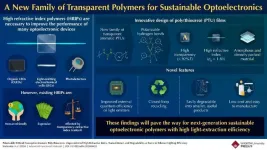(Press-News.org) The American College of Lifestyle Medicine (ACLM) has developed a clinical tool to help health care professionals incorporate a food as medicine approach into their practice by assessing and tracking the proportion of whole, unrefined plant-based foods and water intake in their patients’ dietary patterns.
The ACLM Diet Screener, a 27-item diet assessment tool available free on ACLM’s website, was designed to guide clinical conversations around diet and support nutrition prescriptions, while also being brief enough for use during routine clinical encounters. A multidisciplinary team of clinicians provided input on development of the tool.
While other dietary assessment tools exist, the ACLM Diet Screener is unique because it aligns specifically with the needs of lifestyle medicine clinicians who tend to prescribe a predominantly plant-based diet, captures a picture of the overall diet, and includes simple measures that are understandable and actionable for the patient, said ACLM Senior Director of Research Micaela Karlsen, PhD, lead author on a paper about the screener’s development published April 26 in Frontiers in Nutrition.
“Research demonstrates that various kinds of plant-based diets are associated with lower risk of chronic diseases and can be effective interventions for the treatment of cardiovascular disease and even remission of type 2 diabetes,” Dr. Karlsen said. “But there was a clear need by clinicians for a tool to better help them bridge that nutritional research into a clinical setting, as well as support treatment protocols and behavior change in patients. The ACLM Diet Screener was developed with these goals in mind.”
Lifestyle medicine physicians and nutrition researchers were among the team that started developing the tool in 2021. The team consulted a wide range of resources, such as the U.S. Dietary Guidelines and My Plate, the DASH Diet and the Healthy Eating Index, as well as the tools presented in the Register of Validated Short Dietary Assessment Instruments from the National Institutes of Health, to identify specific foods and beverages to include in the screener, and how to categorize them. After an iterative design process and pilot testing period, the final version of the screener features 20 questions on food consumption, six on beverage consumption and one on nutrients and supplements. Food categories include fruit, leafy green vegetables, legumes, dishes made with meat, eggs or seafood, as well as fast food, frozen meals, restaurant/take out and fried foods.
Upon completion of the questionnaire, summary scores are tabulated for total whole plant food frequencies as a proportion to total food frequencies, and for total water frequency as a proportion to total beverage frequency. The score summaries can be viewed easily and quickly by a member of the care team or, if time permits, the summaries can be formatted into simple pie charts for the purposes of clinical conversations with patients. The screener includes pictures of foods representing the categories to help ensure the questionnaire is easily understood by all patients.
Almost 90% of the 539 health professionals who participated in the pilot assessment of the Diet Screener reported that it was brief enough to use in a clinical setting and 68% indicated they planned to use it, according to the Frontiers in Nutrition article.
“Time is a big barrier for clinicians who want to engage in meaningful conversations with patients about their eating patterns and other lifestyle behaviors,” said Erin Campbell, MD, MPH, clinical assistant professor of Public Health Sciences and co-founder of the University of Rochester Nutrition in Medicine Research Center. “One recent study found that in typical patient encounters, physicians only spend about one quarter of their time with patients directly but spend half of their time dealing with administrative duties like electronic health records. We were pleased that the vast majority of clinicians who reviewed the screener found it useful despite the time constraints they face.”
Another unique aspect of the screener is its relevance to different ethnic and cultural groups that include African American, Hispanic/Latino, Asian American, Native American, and Indian American. Subject matter experts representing those demographic groups reviewed the food examples and recommended additions based on their perspectives and the experiences of that culture.
“We wanted to be relevant to the broadest audience possible and, while there are other screeners that exist for specific populations, we are unaware of any single tool that is as flexible to a wide variety of patient populations such as the ACLM Diet Screener,” said Susan Friedman, MD, MPH, DipABLM, FACLM, Professor of Medicine at the University of Rochester and a study author. “Our hope is that clinicians will find this tool helpful for many different patients, even if their practice is very busy.”
About ACLM®
Serving as a transformation catalyst, disruptor of the status quo, and a galvanized force for change, the American College of Lifestyle Medicine is the nation’s medical professional society advancing the field of lifestyle medicine as the foundation of a redesigned, value-based and equitable healthcare delivery system, essential to achieving the Quintuple Aim and whole person health. ACLM educates, equips and supports its members through quality, evidence-based education, certification and research to identify and eradicate the root cause of chronic disease, with the clinical outcome goal of health restoration as opposed to lifelong disease management.
END
American College of Lifestyle Medicine announces unique screening tool for clinicians to efficiently assess patient dietary patterns
The ACLM Diet Screener is a free assessment tool that quickly captures a picture of overall diet and has simple measures that are understandable and actionable for the patient
2024-04-30
ELSE PRESS RELEASES FROM THIS DATE:
Cranberry extracts could boost microbiota and counter cardiometabolic diseases
2024-04-30
Québec, April 30, 2024 - Cranberry extracts appear to improve intestinal microbiota and help prevent chronic diseases such as diabetes and cardiovascular diseases. The study of Université Laval and the Institute of Nutrition and Functional Foods (INAF) reported beneficial effects after only four days of use.
Cranberries and berries are associated with multiple health benefits, mainly attributed to their high content of polyphenols, in the form of tannins. They also contain high concentrations of oligosaccharides, small fibres that are thought to contribute to their bioactivity.
The research team, led by Yves Desjardins, professor ...
Discovery of uranium-contaminated soil purification material without secondary environmental pollution
2024-04-30
Nuclear energy has long been regarded as a next-generation energy source, and major countries around the world are competing to secure cutting-edge technologies by leveraging the high economic efficiency and sustainability of nuclear power. However, uranium, which is essential for nuclear power generation, has serious implications for both soil ecosystems and human health. Despite being a key radioactive material, uranium poses significant health risks due to its chemical toxicity to the kidneys, bones, and cells. As a result, both the U.S. Environmental Protection Agency and the World Health Organization recommend allowing and advocating for uranium concentrations in wastewater ...
The carbon emissions of academic astronomy
2024-04-30
The carbon emissions associated with air travel to professional conferences make up a sizable fraction of the emissions produced by academia. Andrea Gokus and colleagues estimated the CO2-equivalent emissions for conference travel to all 362 open meetings in the field of astronomy in 2019. The total is an estimated 42,500 tCO2e, or about one ton per participant per meeting. According to the authors, networking and discussing new scientific developments at meetings is important for advancing the field, but adjustments can be made to reduce the hefty carbon cost. Holding meetings virtually ...
Journal of Pharmaceutical Analysis articles reveal the importance of phytocompounds and metabolomics analysis
2024-04-30
IBD is a common chronic gastrointestinal disorder and current treatment strategies can cause adverse effects. Thus, there is a need to identify alternative compounds to treat IBD. Similarly, the dose-related toxicity and efficacy of anticancer drugs needs to be monitored accurately to improve the treatment outcomes. Moreover, over the years, plant-based therapeutic compounds and traditional Chinese medicine formulas have gained attention for their enhanced healing effects and are promising for various treatment regimens.
The recent issue of the JPA, published ...
Great strides in the development of high refractive index polymers for optoelectronics
2024-04-30
Optoelectronic devices have found their way into many aspects of our daily lives, from OLED displays to photodetectors, security systems, and environmental monitoring. In all the applications, these devices utilize high refractive index polymers (HRIPs) to control light.
In general, the optical properties of transparent HRIPs enable efficient light transmission and manipulation, allowing optoelectronics devices to guide and control the flow of light to improve their performance. However, there are no low-cost options for HRIPs that can guarantee good optical performance while being transparent and environmentally ...
Engineered increase in mesophyll conductance improves photosynthetic efficiency in field trial
2024-04-30
It is possible to engineer increased mesophyll conductance in plants according to new research from the University of Illinois. Mesophyll conductance plays a key role in photosynthesis and refers to the ease with which CO2 can diffuse through a leaf’s cells before reaching the location where it is ultimately turned into sugar to feed the plant (carbon fixation). CO2 faces barriers as it moves through the leaf, including its own cell walls. Researchers from the Long Lab found that by increasing permeability and slightly reducing the thickness of cell walls, they could increase CO2 diffusion and uptake in a model crop.
“This is one of the ...
Unlocking the genetic mysteries behind plant adaptation: New insights into the evolution of a water-saving trait in the pineapple family (bromeliaceae)
2024-04-30
Researchers at the University of Vienna, along with collaborators from France, Germany, Switzerland and the USA, have achieved a major breakthrough in understanding how genetic drivers influence the evolution of a specific photosynthesis mechanism in Tillandsia (air plants). This sheds light on the complex actions that cause plant adaptation and ecological diversity. The results of their study are now published in Plant Cell.
Some plant species have evolved a water-saving trait called Crassulacean Acid Metabolism (CAM). CAM plants like most ...
Childcare pick-up: a 1-hour window to build healthier eating habits
2024-04-30
Millions of working parents know the routine: bustle the kids off to childcare in the morning, work all day, then fight the daily traffic jams to get the kids back home. Something to drink, maybe a snack to munch, can help ease the commute.
Understandably, few parents take the time to think about the nutrients or calories involved, but experts at Cincinnati Children’s decided to take a closer look. Their eyebrow-raising findings were published April 27, 2024, in the journal Children’s Health Care.
The researchers took a fresh look at older data contained in daily food journals kept by more than 300 families of children who attended 30 childcare ...
MD Anderson and Replay announce FDA clearance of IND application for first-in-class PRAME-targeted TCR NK cell therapy for hematological malignancies
2024-04-30
HOUSTON, SAN DIEGO and LONDON ― The University of Texas MD Anderson Cancer Center and Replay today announced that the Food & Drug Administration (FDA) has issued a ‘safe to proceed’ for the Investigational New Drug (IND) application for PRAME TCR/IL-15 NK (SY-307), an engineered T cell receptor natural killer (TCR NK) cell therapy for relapsed/refractory myeloid malignancies. MD Anderson is the IND sponsor.
PRAME TCR/IL-15 NK (SY-307) is being developed by Syena, an oncology-focused product company launched by Replay and MD Anderson based on the scientific discoveries of Katy ...
Discovery of mechanism plants use to change seed oil could impact industrial, food oils
2024-04-30
PULLMAN, Wash. -- Researchers have discovered a new mechanism of oil biosynthesis and found a way to genetically engineer a type of test plant to more efficiently produce different kinds of seed oil that it otherwise wouldn't make.
While the engineering is proof-of-concept, this discovery could lead to improved production of valuable oils used in food and by a range of industries. The study, led by Washington State University researchers, was published in the journal Nature Communications.
“Scientists have been working on producing ...
LAST 30 PRESS RELEASES:
6 in 10 US women projected to have at least one type of cardiovascular disease by 2050
People’s gut bacteria worse in areas with higher social deprivation
Unique analysis shows air-con heat relief significantly worsens climate change
Keto diet may restore exercise benefits in people with high blood sugar
Manchester researchers challenge misleading language around plastic waste solutions
Vessel traffic alters behavior, stress and population trends of marine megafauna
Your car’s tire sensors could be used to track you
Research confirms that ocean warming causes an annual decline in fish biomass of up to 19.8%
Local water supply crucial to success of hydrogen initiative in Europe
New blood test score detects hidden alcohol-related liver disease
High risk of readmission and death among heart failure patients
Code for Earth launches 2026 climate and weather data challenges
Three women named Britain’s Brightest Young Scientists, each winning ‘unrestricted’ £100,000 Blavatnik Awards prize
Have abortion-related laws affected broader access to maternal health care?
Do muscles remember being weak?
Do certain circulating small non-coding RNAs affect longevity?
How well are international guidelines followed for certain medications for high-risk pregnancies?
New blood test signals who is most likely to live longer, study finds
Global gaps in use of two life-saving antenatal treatments for premature babies, reveals worldwide analysis
Bug beats: caterpillars use complex rhythms to communicate with ants
High-risk patients account for 80% of post-surgery deaths
Celebrity dolphin of Venice doesn’t need special protection – except from humans
Tulane study reveals key differences in long-term brain effects of COVID-19 and flu
The long standing commercialization challenge of lithium batteries, often called the dream battery, has been solved.
New method to remove toxic PFAS chemicals from water
The nanozymes hypothesis of the origin of life (on Earth) proposed
Microalgae-derived biochar enables fast, low-cost detection of hydrogen peroxide
Researchers highlight promise of biochar composites for sustainable 3D printing
Machine learning helps design low-cost biochar to fight phosphorus pollution in lakes
Urine tests confirm alcohol consumption in wild African chimpanzees
[Press-News.org] American College of Lifestyle Medicine announces unique screening tool for clinicians to efficiently assess patient dietary patternsThe ACLM Diet Screener is a free assessment tool that quickly captures a picture of overall diet and has simple measures that are understandable and actionable for the patient






